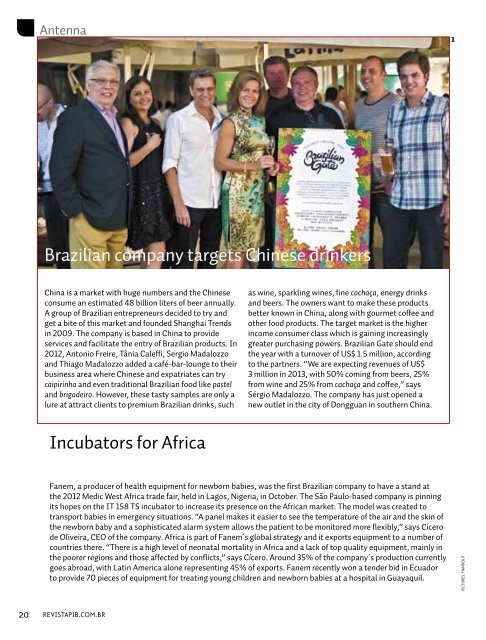IN MANY LANGUAGES - Revista PIB
IN MANY LANGUAGES - Revista PIB
IN MANY LANGUAGES - Revista PIB
You also want an ePaper? Increase the reach of your titles
YUMPU automatically turns print PDFs into web optimized ePapers that Google loves.
Antenna1Brazilian company targets Chinese drinkersChina is a market with huge numbers and the Chineseconsume an estimated 48 billion liters of beer annually.A group of Brazilian entrepreneurs decided to try andget a bite of this market and founded Shanghai Trendsin 2009. The company is based in China to provideservices and facilitate the entry of Brazilian products. In2012, Antonio Freire, Tânia Caleffi, Sergio Madalozzoand Thiago Madalozzo added a café-bar-lounge to theirbusiness area where Chinese and expatriates can trycaipirinha and even traditional Brazilian food like pasteland brigadeiro. However, these tasty samples are only alure at attract clients to premium Brazilian drinks, suchas wine, sparkling wines, fine cachaça, energy drinksand beers. The owners want to make these productsbetter known in China, along with gourmet coffee andother food products. The target market is the higherincome consumer class which is gaining increasinglygreater purchasing powers. Brazilian Gate should endthe year with a turnover of US$ 1.5 million, accordingto the partners. “We are expecting revenues of US$3 million in 2013, with 50% coming from beers, 25%from wine and 25% from cachaça and coffee,” saysSérgio Madalozzo. The company has just opened anew outlet in the city of Dongguan in southern China.Incubators for AfricaFanem, a producer of health equipment for newborn babies, was the first Brazilian company to have a stand atthe 2012 Medic West Africa trade fair, held in Lagos, Nigeria, in October. The São Paulo-based company is pinningits hopes on the IT 158 TS incubator to increase its presence on the African market. The model was created totransport babies in emergency situations. “A panel makes it easier to see the temperature of the air and the skin ofthe newborn baby and a sophisticated alarm system allows the patient to be monitored more flexibly,” says Cícerode Oliveira, CEO of the company. Africa is part of Fanem´s global strategy and it exports equipment to a number ofcountries there. “There is a high level of neonatal mortality in Africa and a lack of top quality equipment, mainly inthe poorer regions and those affected by conflicts,” says Cícero. Around 35% of the company´s production currentlygoes abroad, with Latin America alone representing 45% of exports. Fanem recently won a tender bid in Ecuadorto provide 70 pieces of equipment for treating young children and newborn babies at a hospital in Guayaquil.Pictures: Handout20 revistapib.com.br
















